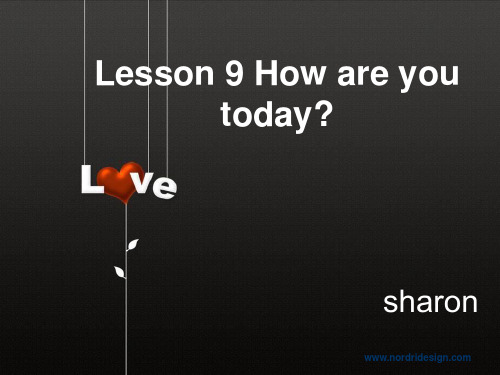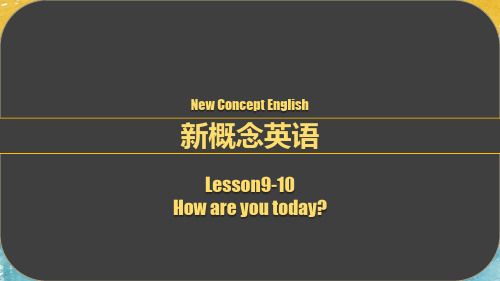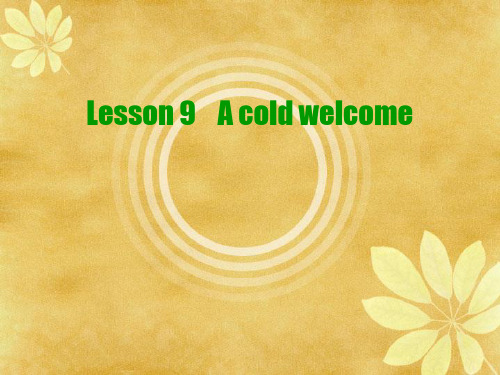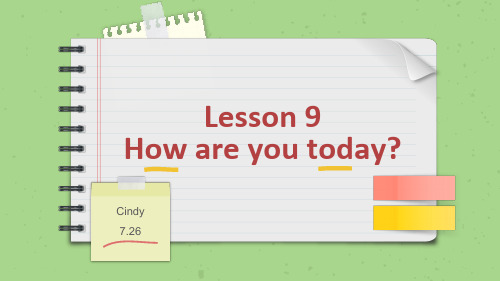新概念英语lesson9,10讲解
新概念英语第一册Lesson910Howareyoutoday小学英语全国通用

Language Point
语句讲解、课文讲解
Steven (hot) Look at Steven! He's hot
Emma (cold) Look at Emma! She's cold.
Language Point
语句讲解、课文讲解
That milkman (old) Look at that milkman! He's old.
man的反义词。
Language Point
语句讲解、课文讲解
Look at that policeman! He's tall. Look at that policewoman! She's short. policeman : 男性警察 policewoman : 女性警察 tall : 长的 , 高的 short : 短的 , 矮的
查看答案解析
答案:policewoman 解析: 考查词义 policewoman n. 女警察;女警官;
语句讲解、课文讲解
同学们 , 请对照教材听老师讲解!
How are you today?
同学们 , 请做一下课堂笔记。
Language Point
语句讲解、课文讲解
how : 疑问副词,怎么样 what : 什么 e.g. What is your name? 你叫什么名字? —How are you? —I'm fine, thank you. / Fine, thank you.
Emma is very well. 艾玛很好。
Vocabulary
词汇精讲
today
adv. 今天
o : 不发 [o] 而发 [ə] 做副词 , 表示今天 e.g. I am late today. 我今天迟到了。 today作副词时 , 句中位置灵活 Today I am late. > I 始终大写
新概念英语第一册+Lesson+9-10+How+are+you+today(课件)+

• see /si:/ v.见 • Did you see her? • I see many stars in the sky. • see-saw过去式 • look for寻找 • find找到
• well /wel/ adj.身体好 • I am very well. • She can skate well. • well在这里作为副词使用
Lesson 9-10
How are you today?你今天 好吗?
• hello /hs'lao/ int.喂(表示问候) • hi /ha[/ int.喂,嗨 • 这两个均是见面时打招呼的用语 • Hello,Sam. • Hello,Bobby!
• how /hao/ adv.怎样 • How are you?你好吗? • 还可以询问方式 • How do you come to school every day? • By taxi • 你每天是如何上学的? • How is the weather? • 天气怎么样?
!
Reading
• 史蒂文:你好,海伦。 . • 海伦:你好,史蒂文。 • 史蒂文:你今天好吗? • 海伦:很好,谢谢你。你好吗?
• STEVEN : How is Tony? • HELEN : He's fine, thanks.How's Emma? • 史蒂文:托尼好吗? ' • 海伦:他很好,谢谢。埃玛好吗? • How be sb? • 问某人怎么样?
• hot /hot/ adj.热的 • cold /ksold/ adj.冷的 • old /auld/ adj,老的 • young /jAt)/ adj.年轻的 • busy /'bizi/ 忙的 • lazy /'leizi/ adj.懒的 • She is busy. • He is lazy boy他是一个很懒惰的男孩
新概念英语第一册第9课课件

Sophia
Words and expressions
fat
thin
tall short
clean
dirty
hot
cold
olExercise
Listen and tell the number of the word. 1fat 2thin 3tall 4short 5dirty 6.clean 7.hot 8.cold 9.old 10.young 11.busy
T:How……? S:How is Steven?
THANKS!
数
Comprehension
T:What’s her name?
S:Helen T:How is Helen?
S:She is very well.
Asking and answering questions
1 T: Ask me if Steven is well today. S:Is Steven well today?
zy 13.see 14.Well 15.How 16fine 17goodbye 18today 19hello 20thanks
A story about greeting…
Story time
Watch the video and answer:
How is Emma?
Listening and imitation
二、Greetings. Hello ! Hi ! Good morning ! Good evening !
Good afternoon !
How are you ?
How do you do !
Nice to meet you ! Glad to meet you !
新概念英语第一册lesson9-10

Steven:Goodbye, Helen. Nice to see you.
Helen:Nice to see you, too, Steven. Goodbye.
• Nice to see you!-见到你很高兴!
见到你真高兴。 用于第二次见面或朋友之间 回答也是Nice to see you!
• 罗伯特:我是新来的学生,我的名字叫罗伯特。 • 索菲亚:很高兴见到你。我的名字叫索菲亚。 • 罗伯特:你是法国人吗? • 索菲亚:是的,我是法国人。 • 索菲亚:你也是法国人吗? • 罗伯特:不,我不是。 • 索菲亚:你是哪国人? • 罗伯特:我是意大利人。 • 罗伯特:你是老师吗? • 索菲亚:不,我不是。 • 罗伯特:你是做什么工作的? • 索菲亚:我是电脑录入员。 • 索菲亚:你是做什么工作的? • 罗伯特:我是工程师。
young/j∧ŋ/ adj. 年轻的
old /əud/ adj. 年老的
busy /'bizi/ adj. 忙碌的 a busy day忙碌的一天
lazy /'leizi/ adj. 懒的 Mary is very lazy.
• Look at… She\He\It is + adj .
• She isn’t …,She is …
fat /fæ t/ adj.胖的 short /ʃɔ:t/ adj.矮 的
['wumən] 女人
women /'wimin/
[mæ n] 男人
men /men/
/lɒŋ/ 长的 / ʃɔ:t / 短的
thin [θin] 瘦的 tall /t :l/ 高的
新概念英语第一册-Lesson-9-10PPT课件

-
43
Look at that policeman!
Is he short?
No, he isn’t.
tall
Is he tall?
Yes, he is.
-
44
short
Look at that policewoman!
Is she tall? No, she isn’t.
Is she short? Yes, she is.
Lesson 7 Are you a teacher?
-
1
Robert: I’m a new student. My name’s Robert.
Sophie: Nice to meet you. My name’s Sophie.
Robert: Are you French?
Sophie: Yes, I am. Are you French, too?
Robert: I’m Italian.
-
3
罗伯特:你是教师吗?
Robert: Are you a teacher? 索菲娅:不,我不是。
Sophie: No, I’m not. 罗伯特:你是做什么工作的?
Robert: What’s your job? 索菲娅:我是电脑录入员。
Sophie: I’m a keyboard operator. 索菲娅:你是做什么工作的?
语,问及对方的先生或太太的情况。
请翻译:
1. Sophie好吗?
____________________________
2. 你Ho_儿w__子is 好So吗ph?ie?
Ho_w__is__y_o_u_r _s_o_n_?________________ __
新概念英语第一册Lesson 9&10

Key Points:
adj. 身体好的;健康的 adv. 好地;满意地;彻底地;充分地 int. (表示惊讶、同意)嗯;哎; e.g.: 他考试成绩很好。 He did very well in the exam. e.g.: 我和她不熟。 I don't know her well. e.g.: 医生说你过几天就会恢复健康。 The doctor says you will be well again in a few days. e.g.: Well, what a surprise! • well
woman [‘wumən] 女人
man [mæ n] 男人
pig [pig] 猪
fat [fæ t] 胖的
am [æ m] be动词,是 it [it] 它
he [hi:] 他
she [ʃi:] 她
is [iz] be动词,是
thin [θin] 瘦的
rabbit ['ræ bit] 兔子
• • • • • • • • • • 史蒂文:你好,海伦 海 伦:你好,史蒂文 史蒂文:你今天好吗? 海 伦:很好,谢谢你。你好吗? 史蒂文:很好,谢谢。 史蒂文:托尼好吗? 海 伦:他很好,谢谢。埃玛好吗? 史蒂文:她也很好,海伦。 史蒂文:再见,海伦。见到你真高兴。 海 伦:我见到你也很高兴,史蒂文。再见。
Key Points:
→ how soon (多长时间)以后;多快 e.g.: --- 飞机还有多久起飞? --- 20分钟后。 How soon will the plane take off? --- In 20 minutes. → how many (much) (数量)多少 → how about (doing sth.) (做某事)如何 e.g.: 这个周末购物怎么样? How about shopping this weekend? → how much (价格)多少 → how often (频率)多少 e.g.: How often do you brush your teeth? --- Twice a day.
新概念英语第一册课件PPT Lesson9-10(优质)

新概念英语
Lesson9-10 How are you today?
New Concept English
VOCABULARY
New Concept English
How do you do?
How do you do?
VOCABULARY
New Concept English
New Concept English
GRAMMAR
What ... ... like?
对人体型发问需要使用: What ... like
New Concept English
GRAMMAR
特殊疑问句 How is he? 一般疑问句 Is he happy?
陈述句 Look at that boy.
He is happy.
New Concept English
GRAMMAR
How ... ?
根据对方的状态发问需要 使用:How...
New Concept English
新概念英语
THANK YOU!
New Concept English
VOCABULARY
busy adj.繁忙的
The mother is very busy.
New Concept English
VOCABULARY
thin adj.瘦的
The man is thin.
fat adj.胖的
The man is fat.
New Concept English
VOCABULARY
tomorrow n.明天 today n.今天 yesterday n.昨天
New Concept English
新概念英语第二册课件Lesson 9 (共21张PPT)

• 2. (眉等)皱起
• 3. 生脓,化脓 名词 n. 1. 聚集
• 2. 收获量
gather指人们聚 集在一起,尤指 自发性的聚集
• 3. 衣褶
• refuse
美音:[rɪ'fjuz]
• refuse 1 及物动词 vt. 1. 拒绝;拒受;拒给;不准[O1] He refused my offer of help. 他拒绝了我的帮助。
1st •表示具体时间 on Wednesday
evenday
•用at的时间短语:
•表示确切时间 at five to twelve •表示用餐时间 at lunchtime •表示具体时间 at night
• during 在···期间 • during the hoilday 强调假期从头到尾 • from ···till ··· 指一段明确的时间 • until 直到 • until的主句和从句两个都用一般过去时(
refuse sb\sth refuse to do
•welcome 美音:['wɛlkəm]
• welcome sb to+地点 • a warm welcome 热烈的欢迎 • You are welcome to+地点
• strike
美音:[straɪk]
• v:打,击,弹,敲···(钟,乐器···)
• 5. 猜想,推测+(that) I gather that he is the one in charge. 我猜想他是负责的人。
• 6. 使皱起
She gathered her brows into a frown. 她皱起了眉。
• 不及物动词 vi. 1. 积聚;集合
新概念英语第三册:Lesson9~11重点句型解析

【导语】新概念英语作为家喻户晓的经典之作,它有着全新的教学理念,有趣的课⽂内容及其全⾯的技能训练,为⼴⼤的英语学习者提供帮助!如果你也想学好英语,⼜怎能错过新概念英语?下⾯为您提供了相关内容,希望对您有所帮助!新概念英语第三册:Lesson9重点句型解析 1、How do cats try to protect themselves when falling from great heights? Cats never fail to fascinate human beings. never fail to 双重否定意味肯定(运⽤双重否定结构加深句⼦肯定的语⽓) -- If you ask for help in the polite way, you never fail to succeed. -- If you receive requests like this, you'll never fail to accept. 双重否定结构:(起加深句⼦肯定的语⽓的作⽤) 1>否定词+fail to -- never fail to / can't fail to / don't fail to 2>否定的形容词之前加以否定 -- What he said is not unreasonable.(adj.不讲道理的, 不合理的) -- It is quite common for us to make mistakes. = It is not uncommon for us to make mistakes. 3> not + without -- You can't obtain English without working hard. Obtain(vt.获得, 得到) -- He doesn't have any meal without meats. 4> no + not -- There is no cat that doesn't like fish. -- There is nothing that he can't do. 没有什么他不能做的。
新概念英语第一册Lesson9-10笔记(语法点+配套练习+答案)

1、单词分类;
int.
adv.
adj.
v.
hello
hi
thanks
goodbye
how
today
well
fine
see
2、课文复习
三、课文重点
重点
练习
look at sb. / sth.看(强调动作)
see sb. / sth.看到(强调结果)
__Look at___that dog!快看那条狗!
He isfine.对划线部分提问:How is he?
She isvery well.对划线部分提问:How is she?
3.与how有关的特殊疑问词
how old
多大(年纪)
how many
多少(可数)
how far
多远
how tall
多高
how much
多少(不可数)
how often
多久一次
4.句型转换
肯:The man isbusy.
否:The man is not busy.
一疑:Is the man busy?
答:Yes, he is. / No, he isn’t.
特:How is the man?
5.选择题
肯:The box isheavy.
否:The box is not heavy.
表语:用来描述主语状态或特征,名词或形容词可做表语
She is tall.
He is thin.
We are young.
It is happy.
The man is strong.
新概念英语第一册第9-10课ppt

Goodbye ,Helen . Nice to see you . Nice to see you , too ,
Steven .Goodbye .
Focus on gramma
代词
定义:
代词是一种能代 替名词、形容词 或数词的词。
单数 格 主格 宾格 人称 第一人称 I me 第二人称 you you he him 第三人称 she her it it
fat
肥胖的
New Words hot 热的
cold
busy 忙碌的
dirty 脏的
lazy
clean
New Words
t_ll
高的
sh_rt
y_ _ng
年轻的
_ld
th_n
f_t
肥胖的
New Words
h_t 热的 b_s_ 忙碌的
d_ _t_ 脏的
c_ld l_z_
cl_ _n
Key Structures
Homework 1.L9-L10单词四遍带汉语。 2.课课练P13-15 3.语音L7和L9。
Hello ,Helen .
Hi ,Steven .
How are you today ? I’m very well ,thank yne .Thanks.
How is Tony? He is fine .
How is Emma ? She is very well ,too.
1.用于朋友或相识的人之间的寒 暄话
How are you?
回答:Fine (I am very well),thank you. And you?
注:And you?是And how are you? 的简略说法
新概念英语第二册第九课课文详解

Lesson 9 A cold welcome 冷遇 ⼀、⽣词讲解 1、welcome n. 欢迎;v. 欢迎 a cold welcome 冷遇 welcome to+地点 例如:welcome to China You are welcome./welcome adj.或You are welcome to+地点 例如:welcome to my home/welcome home/ welcome back 2、crowd n. ⼈群 crowd :in the crowd I spotted him in the crowd ⼀眼看见 a crowd of people 没有次序的⼈群,拥挤的⼈群 a group of people 有次序的⼈群 crowd v.拥挤,挤满 a large crowd of people ⼀⼤群⼈/crowds of people 许多⼈,⼈⼭⼈海 3、gather v. 聚集 people gathered ⼈们聚集在⼀起,尤指⾃发性的聚集 4、hand n. (表或机器的)指针 hand n.⼿ minute hand/second hand/hour hand second hand ⼆⼿的,旧的 wait me a moment/wait me a few seconds(for a few seconds.) 5、shout v. 喊叫 call out ⼤声喊叫 cry out ⼤声哭喊 scream 尖叫 ⼆、本⽂重点语法讲解 本篇课⽂的重点是时间介词的⽤法。
这部分知识点实⽤性很强,在PET, BETS2 中是必考项⽬,同时在⼩升初考试中也是完形填空常考知识点。
只要多⽐较,多练,通过造句⼦区分各个知识点,学⽣⼤部分都能将这部分知识点掌握好,尤其时想在考试中拿⾼分的学⽣,千万不要忽视这样的细节知识点哦! 让我们来看看具体的时间介词家族成员吧: At:表⽰在某时刻,时间,阶段,如at noon 在中午,at night在夜晚,还有具体时刻at 12 o'clock等;时刻前的介词⽤at:at five to twelve作时间状语 In :强调在⼀段时间内,如在早,午,晚in the morning, in the afteronno, in the evening. 课⽂中in twenty minutes' time 20分钟之后,in 表⽰在段时间以后,根据时态判别in 表⽰的含义。
新概念英语第一册Lesson 9-10课件

Q:How is Emma?
well [wel] adv. 好;对 adj. 健康;身体好 He cooks well.
do well in = be good at 擅长...
Get well soon! 愿早日康复!
fine [fain] adj. 美好的;健康的;好看的
3. The classroom is dirty. (变为同义句) The classroom is ____ _____. 4. Please ____ the picture. A. look B. look at C. see 5. How ___ you?
How ___ she? How ___ Linda? 回答:
如何回答how are you
I’m fine/well/great. Not too bad. Pretty good!
Couldn’t be better! Just so-so.
And you? = And how are you?
today 今天
yesterday 昨天 tomorrow 明天 the day before yesterday 前天 the day after tomorrow 后天
see [si:] v. 看见
see:强调看的结果 I can see a bus.
look at:强调看的目标 Look at me! Look at the time! We’ll be late.
watch:侧重于场面,强调观看的过程 watch TV watch a football game
1. 放在名词前修饰名词 a young nurse an old mechanic
朗文外研社新概念英语第一册第5节(Lesson9—Lesson10)课件

The key:
A :你好,汤姆,很开⻓⻓到你。 Hello,Tom, nice to meet you. B:你好呀,莉莉,你都好吗? Hi,Lily, how are you? A:我过的⻓般,我家的⻓狗⻓病了。(sick形容词,病了) Just so so. My dog is sick. B:(听到这事⻓)我很抱歉呀!它现在还好吗?(now副词,现 在)
What is up ?(美国常用)
How is Tony? He's fine,thanks. How's Emma? She's very well,too.
经典句型:
How are you today? I'm very well,thank you. And you? I'm fine,thanks.
1
Lesson 9
How are you today?
how[hau]
How far? How long? How come? = Why?
How much? How many?
adv. 怎样(特殊疑问词)
多远的路? 多久的时间?或⻓度? 为什么?
多少钱(多少的量)? 多少个(询问数量)?
how far is your house? How long does it take to get to your house? How come you are there? =Why are you there?
年轻人 青年 老老少少
Tom is an old head on the young shoulders. 汤姆真是少年⻓成。
Lesson 10 Look at ...?
busy['bizi]
新概念英语第二册第9课全解析

意识到这一点的。
•
3. d
•
the evening 前需要有介词in才能构成表示时间的短语,所以选d.其他3个选择都不
对。
•
4. a
•
people 是集体名词,虽然形式是单数,但意思是复数的(人民或人们),做主语时候
谓语动词要用复数形式。 B. was, c. is , d be 都不能用在people 后面做谓语动词,只有a.
•
现在是十二点过两分。
•
10. b
•
只有b. an hour 是正确答案,其他选择都不符合事实。
•
11. d
•
根据生活常识应该选d. watch(手表),这个句子的意思是“大多数人带手表”,这是事实。而选
a. an alarm clock(闹钟)或 c. a clock(钟表)都与事实不符合,人们总不可能随身携带着闹钟或钟。而选
当主语。a. nothing可以做主语,但一般不用在疑问句中;c. any 是量词,不能做主语;d. a thing可以做
主语,用在这个问句中意思虽然通顺,但不符合习惯用法;b. anything 是不定代词,可以做主语,而
且只能在疑问句中做主语,所以b.是对的。
•
8. dBiblioteka •a. hit , b. beat, c. knock , d. strike 这几个动词中都有“敲”,“打”,“击”的意思,但是只有
Text 课文
A cold welcome What does 'a cold welcome' refer to? On Wednesday evening,we went to the Town Hall. It was the last day of the year and a large crowd of people had gathered under the Town Hall clock. It would strike twelve in twenty minutes' time. Fifteen minutes passed and then,at five to twelve,the clock stopped. The big minute hand did not move. We waited and waited,but nothing happened. Suddenly someone shouted. 'It's two minutes past twelve!The clock has stopped!' I looked at my watch. It was true. The big clock refused to welcome the New Year. At that moment,everybody began to laugh and sing.
新概念英语第二册 Lesson 9课件

1.+世纪 in the 21st century 2.+季节
in
in spring
in summer
in autumn
in winter
in
3.+年代、年份、月份
在20世纪90年代 in the 1990s
在1990年
in 1990
在九月
in September
4.+泛指的上午、下午和傍晚
在上午 在下午 在傍晚
Lesson 9
A cold welcome
01
New words
New words
1.crowd /kraʊd/ n.人群;群众 A small crowd gathered outside the church. 一小群人聚集在教堂外。 a crowd of 一群 Mr. Frank was followed by a crowd of students. 弗兰克先生后面跟着一群学生 crowded /ˈkraʊdɪd/ adj.拥挤的—uncrowde 不拥挤的 By ten o’clock the bar was crowded. 到了十点钟,酒吧里非常拥挤。
2.hand /hæ nd/ n.手;(表或机器的)指针
➢ hand in hand 手牵手 They walked away hand in hand. 他们手拉ห้องสมุดไป่ตู้走了。
➢ lend/give a hand 伸出援手 He always lends a hand when we are in trouble. 当我们遇到困难时,他总是伸出援手。
hand v.交;递 ➢ hand in 上交(作业等)
The teacher told the students to hand in their exercises. 老师要同学们上交练习题。 ➢ hand out 分发 I’ll hand out advertisements after school. 放学后我会发广告。
- 1、下载文档前请自行甄别文档内容的完整性,平台不提供额外的编辑、内容补充、找答案等附加服务。
- 2、"仅部分预览"的文档,不可在线预览部分如存在完整性等问题,可反馈申请退款(可完整预览的文档不适用该条件!)。
- 3、如文档侵犯您的权益,请联系客服反馈,我们会尽快为您处理(人工客服工作时间:9:00-18:30)。
龙文教育学科老师个性化教案教师学生姓名上课日期2013.11.24 学科英语年级八年级教材版本人教版学案主题新概念第二册lesson 9,10课时数量(全程或具体时间)第(4)课时授课时段15:00-17:00教学目标教学内容新概念第二册lesson 9,10个性化学习问题解决新概念第二册lesson 9,10教学重点、难点难点:新概念语法讲解词汇句子记忆重点:同上教学过程一.DiscussionWhich is more important, the process or the result?二.Test (Try your best and see your level)16. -Who's that young man on the poster?-Justin Bieber, excellent singer.A. aB. anC. theD. /17.-The sweater is not the right for me.-Well, shall I get you a bigger one or a smaller one?A. priceB. colorC. sizeD. material18.-I've left my keys in the meeting room. Please them for me.-All right.A. buyB. paintC. washD. fetch19. -Your aunt often walks the dog in the morning.-Yeah, bad weather stops her.A. whenB. unlessC. becauseD. since20. -You look . What's up, sir?-I can't find my ticket, but it's time to check in.A. sleepyB.hungryC. tiredD. worried21. The girl is afraid to dance in public because she thinks others may her.A. laugh atB. wait forC. hear ofD. agree with22.-Which magazine do you like better, Crazy Reading or Teens' Space?-I like of them. They are useful for English learners.A. noneB. neitherC. allD. both23. -Can Peter play games with us, Mrs. Hawking?-Wait a minute. He a shower.A. is takingB. takesC. tookD. was taking24.-Do you know Jane visits her grandparents?-Once a week. She loves them deeply.A. how soonB. how oftenC. how longD. how far25. -Bob, your room is a real mess!-. I'll clean it up right away.A. I'd love toB. I hope soC. I'm sorryD. I disagree三.上次内容检测写出以下动词的过去式过去分词四.课文讲解背景知识英国传统节日VS中国传统节日Lesson 9 A cold welcomeWelcomen. 欢迎eg. Thanks for your warm welcome.v. 欢迎welcome sb to sth.eg. Welcome you to my house.Welcome you to visit Beijing.What does ‘a cold welcome’ refer to?refer to 涉及,谈及,参考,指什么Eg. Don’t refer to the matter again. 别再提这件事了。
Refer to a dictionary. 查字典On Wednesday evening,we went to Town Hall.语法重点:介词on +时间Wednesday evening__ Monday morning在周一早晨__ a fine afternoon在一个晴朗的下午其他一些常用搭配:in the eveningon Wednesdayin Aprilin 2010It was the last day of the year and a large crowd of people had gathered under the Town Hall clock.a large crowd of… 一大群gather 聚集,召集gather together/ up 收拢,整理,聚集eg. Gather together/up your papers.把你的文件收拾好。
had gathered 过去完成时一、过去完成时的概念与结构特点概念:过去完成时表示在过去某一时间或动作之前已经发生或完成了的动作,即“过去的过去( past-in-the-past )”。
二、过去完成时的判断依据1. 由时间状语来判定一般说来,各种时态都有特定的时间状语。
与过去完成时连用的时间状语有:( 1 ) by + 过去的时间点。
如: I had finished reading the novel by nine o'clock last night.( 2 ) by the end of + 过去的时间点。
如: We had learned over two thousand English words by the end of last term. ( 3 ) before + 过去的时间点。
如: They had planted six hundred trees before last Wednesday.2. 由“过去的过去”来判定。
过去完成时表示“过去的过去”,是指过去某一动作之前已经发生或完成的动作,即动作有先后关系,动作在前的用过去完成时,在后的用一般过去时。
这种用法常出现在:( 1 )宾语从句中当宾语从句的主句为一般过去时,且从句的动作先于主句的动作时,从句要用过去完成时。
在told, said, knew, heard, thought等动词后的宾语从句。
如:She said that she had seen the film before.( 2 )状语从句中在时间、条件、原因、方式等状语从句中,主、从句的动作发生有先后关系,动作在前的,要用过去完成时,动作在后的要用一般过去时。
如:When I got to the station, the train had already left.After he had finished his homework, he went to bed.注意: before, after 引导的时间状语从句中,由于 before 和 after 本身已表达了动作的先Where did you study before you came here?After he closed the door, he left the classroom.( 3 )表示意向的动词,如hope, wish, expect, think, intend, mean, suppose等,用过去完成时表示"原本…,未能…"We had hoped that you would come, but you didn't.3. 根据上、下文来判定。
I met Wang Tao in the street yesterday. We hadn't seen each other since he went to Beijing.三、过去完成时的主要用法1. 过去完成时表示一个动作或状态在过去某一时间或动作之前已经完成或结束,即发生在“过去的过去”。
如:When I woke up, it had stopped raining.我醒来时,雨已经停了。
(主句的动作发生在“过去的过去”)2. 过去完成时是一个相对的时态,表示的是“过去的过去”,只有和过去某一时间或某一动作相比较时才使用它。
如:He told me that he had written a new book. (had written 发生在 told 之前 )3. 过去完成时需要与一个表示过去的时间状语连用,它不能离开过去时间而独立存在。
此时多与already , yet , still , just , before , never 等时间副词及 by , before , until 等引导的短语或从句连用。
如:Before she came to China, Grace had taught English in a middle school for about five years.Peter had collected more than 300 Chinese stamps by the time he was ten.4. 过去完成时表示某一动作或状态在过去某时之前已经开始,一直延续到这一过去时间,而且动作尚未结束,仍然有继续下去的可能。
如: By the end of last year, he had worked in the factory for twenty years. ( had worked 已有了 20 年,还有继续进行下去的可能)四、过去完成时与现在完成时的区别现在完成时表示的动作发生在过去,但侧重对现在产生的结果或造成的影响,与现在有关,其结构为“助动词 have (has) + 过去分词”;过去完成时则是一个相对的时态,它所表示的动作不仅发生在过去,更强调“过去的过去”,只有和过去某时或某动作相比较时,才用到它。
试比较:I have learned 1000 English words so far.到目前为止我已经学会了 1000 个英语单词。
I had learned 1000 English words till then.到那时为止我已经学会了 1000 个英语单词。
